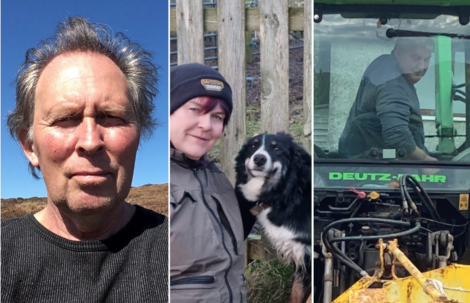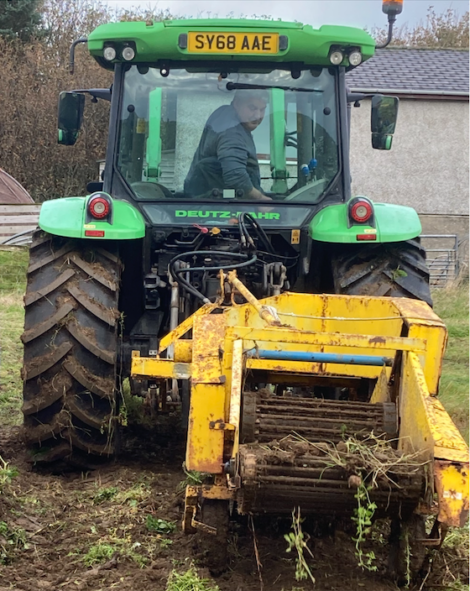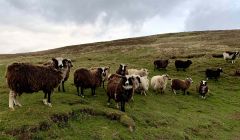Community / ‘Crofting matters’ agree candidates keen to represent the sector
Voting for the Crofting Commission takes place this month
WORKING towards a more viable future of crofting is at the heart of the campaign of all three local candidates vying to become Shetland’s representative on the board of the Crofting Commission for the next five years.
The Crofting Commission, based in Inverness, is the public body that regulates around 20,000 crofts in Scotland – a unique and highly complex system of land tenure and small-scale food production only found in the Highlands and Islands.
As per headlines recently, the commission has been severely criticised by auditors for weak governance and poor relationships between board and management which undermined the day to day running of the organisation.
It is run by a board of nine commissioners; six elected from across the Highlands and Islands, and three appointed by the Scottish Government.
Shetland’s representative on the board has been Papa Stour man Andy Holt for the last five years.
He has put his name forward for another term. Also standing for election are the manager of the Shetland abattoir Lauraine Manson and Unst crofter Duncan Gray.
Andy Holt said that when he first joined the board in 2017 it was obvious that some of the staff “were in a state of emotional shock” and the reputation of the organisation was at an all-time low.
He described the Deloitte report into the problems at the commission as “a boon” in that “finally we were enabled to jointly sort out the lines of communication and authority between the board, the chief executive and the Scottish Government”.
The organisation has recently been given funding to employ eight more staff to work through a backlog of applications for new crofts.
So, what is the future for crofting and what’s the role of the next board and the to-be-elected Shetland commissioner on it?
Become a member of Shetland News
Holt said: “First thing to say is that the future of crofting is in the hands of the crofters. Their vision, enterprise and hard work are the key.
“Having said that, it is in the gift of the Scottish Government to create the conditions for future progress in our sector.
“There are far too many neglected and abandoned crofts in the Highlands and Islands. Although the commission has two new development workers operating in the Western Isles, I am convinced that much stronger medicine is needed to remedy the problems of absenteeism and misuse.
“My preference would be for a proper inspectorate that would meet up with local grazing committees etc.
“Whether or not the Scottish Government is anywhere near ready to tackle the thorny question of legislation is the great unknown.”
Lauraine Manson describes herself as committed to the crofting way of life and acknowledges that nobody ever goes into crofting for the money.
She added: “But once you are there, you have to try to make the best of what you have.
“I see in the future a mixture of challenges and opportunities, and I think all my working life has been about having a vision of the future, and striving to make it a reality.
“In terms of challenges, these are quite acute at present between the exit from the EU and hence the Common Agricultural Policy [CAP], and the urgent need to combat climate changes.
“The other thing I see as essential if crofting is going to grasp the opportunities; I believe the marts and abattoir have created the entry of young folk into crofting.
“For a while, the picture there was gloomy, but not anymore. My observation is that there are a generation of capable young crofters, of both sexes, taking up their family land for the most part.
“That’s essential, because the fresh perspective we need, is far more likely to come from young folk.
“But we need to do more to make this brighter future a reality, and that is where the agencies must come in. Shetland Islands Council, HIE, Shetland Charitable Trust, the Crofting Commission really have to get together and plan for what is needed.”
Duncan Gray meanwhile reminds voters that crofting is more than “the mass production of sheep” but an entire way of life. As such, he sees the lack of youth in crofting as one of the main problems facing this sector of agriculture.
“The greatest problem facing crofting at the moment is ‘old age.’ This is caused by the difficulty in getting into crofting for young folk,” he said.
“There are a number of reasons for this, not least the lack of a new entrant scheme. This should offer incentives for older crofters to retire and assist the new entrant in getting access to a croft and getting started.”
He added: “The important part is that crofters need to get the help and support required to allow them to live on their croft, not just now, this has to be an attractive option for future generations.
He points out that two recent conveners have left the post without completing their full term and the existing convener isn’t standing for re-election.
“I think it would be correct in saying that being at the top in the commission is a very thankless task.
“That being said, the government has promised additional staff to help. I know from the work I have done for the Crofting Commission in the past that it has always been difficult to find the balance between staff working on croft assignations and house site de-crofting or working on breaches in duties such as absenteeism or neglect.
“The additional staff promised should help with this, they may even make it possible to complete everything expected of the Crofting Commission, but I doubt it.”
Voting is now open and closes at 4pm on Thursday 17 March. The results will be available the following day.
Become a member of Shetland News
Shetland News is asking its readers to consider paying for membership to get additional perks:
- Removal of third-party ads;
- Bookmark posts to read later;
- Exclusive curated weekly newsletter;
- Hide membership messages;
- Comments open for discussion.
If you appreciate what we do and feel strongly about impartial local journalism, then please become a member of Shetland News by either making a single payment, or setting up a monthly, quarterly or yearly subscription.

























































































